Zurück ins Archiv
ein Quiz zusammengestellt:
23 Fragen zu "Wo befinden sich unsere Helden und/oder in welchem Buch ist das??"
Die Fragen beziehen sich auf alle historischen Romane von Dorothy Dunnett.
Viel Spaß beim Raten, Knobeln, Nachlesen, Rumblättern...
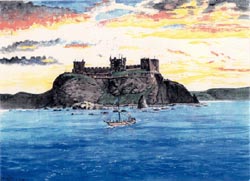
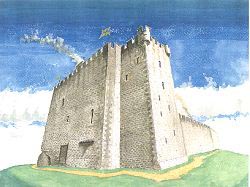
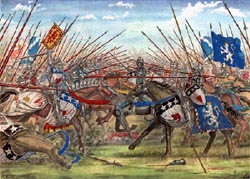
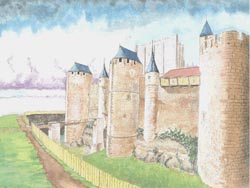
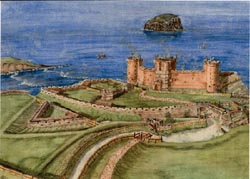
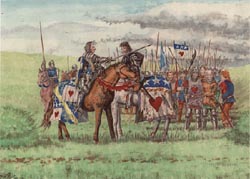
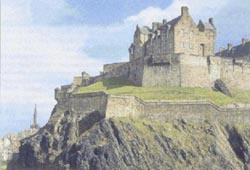
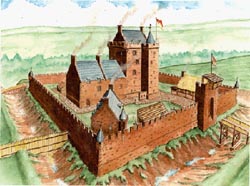
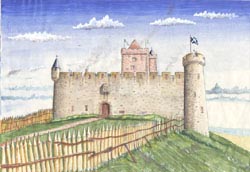
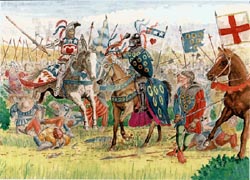
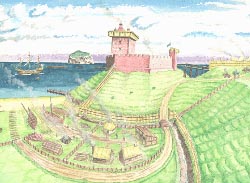
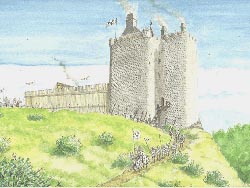
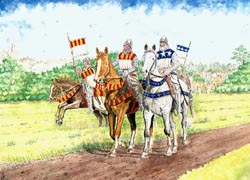
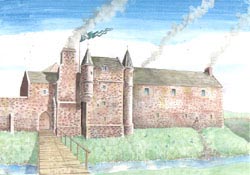
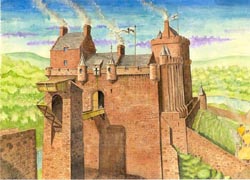
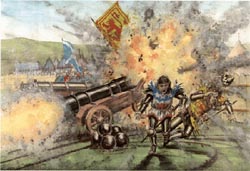
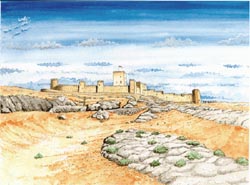
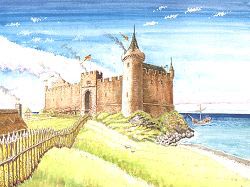
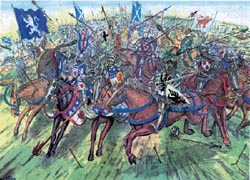
1.
And across the water, you would swear you could sniff it all, the cinnamon and the cloves, the frankincense and the honey and the liquorice, the nutmeg and citrons, the myrrh and the rosewater from Persia in keg upon keg. ... the ostrich feathers and the elephants tusks, the gums and the ginger and the coral buttons mynheer Goswin the clerk of the Hanse might be wearing on his jacket next week. ... It was no accident that the galleys always downed sails and entered harbour in daylight, with the decks sluiced and the rowers and sailing masters in livery and the noblemen commanding each ship in a stiffened gown in the crazy Venetian mode ...
2.
She was not given a veil. Then they took her to the Golden Road. She waited there perhaps ten minutes, her negress smiling behind her. It was narrow and carpeted, and dark in spite of the small silver lamps on the arcaded walls and the most beautiful faience in the world: tomato-red, scarlet and coral, thick-laid on a flawless white ground.
3.
A hand lifted the steatite lamp and brought it over. Set down, the glow burned through a hanging of deep crimson silk. He could not remember whose bed had such a curtain, and could only deduce that, since he could not be on board his ship, there must have been a landing he had forgotten about.
4.
She then walked straight back to the house and climbed through the open bay window. The room inside was quite empty, except for a wainscot cupboard with an aumbry, a painted spruce table and one or two cheapish thrown chairs although the cold fireplace had an overmantle of elaborate friezework, and the ceiling was also carried out in fine decorative plaster. There was a tapestry, discoloured with smoke, on one wall.
5.
So the mines lay derelict, the ruins of workmen′s huts and storehouses littering the broken moorland, ... The rock yielded no fabulous artery of yellow ore, but pebbles and scourings grained and gritted with gold dust and, rarely, and attenuated nugget. Mining was furtive and unlicensed. Week in, week out, the earth brought down by the spring rains was cherished and riddled, and the sparkling fragments folded in twists and rags and taken to a friendly goldsmith who might choose to forget that a tenth of all lawful takings on ... belonged to the Crown.
6.
His plan had been to stay with the child while it slept. Instead, curt words and raised eyebrows forced him out to the butts to help retrieve arrows, ... The lords and their friends worked ... hard, ... and he would have borne them no grudge, had he not been aware of a growing unfriendliness, so that no matter how fast he pelted about, the shouts from the players became brusque and impatient. And as it developed, he watched ... smile.
7.
In the monastery of ... , a nobleman died. Because he had lived there for a long time, the funeral mass was carried out in every particular as he had wanted, even to the inclusion of that type of impassioned liturgy which the Abbot personally despised. No relatives were present, or indeed invited; but afterwards the ... possessions were gathered and laid in four chests by ... , whose silent grief, in defiance of the Divine Purpose, drew a rebuke from the Abbot.
8.
Shown now into the small, warm room, his bright eyes flickered over ... and ... rested a little longer on ... .
But he took, without diffidence, the stool offered him at a proper distance; and plunged, as arranged ... into the strange and fabulous history of the Philosopher's Stone.
9.
Much later, ... realized that fate had improved on some original plan. ... But for themselves, the wood was empty. You could sense it, vacant around you after the running footsteps died away. Even the wild life, flinching from the metal and the angry voices, had abandoned the arena to ... and ... . Shakily, cold with overstrain and post-battle nausea, ... walked out sword in hand to where his enemy was sitting.
10.
In fact, he fell asleep, there where he knelt, and she had to persuade him to move. Once he had given in, he was too tired to undress; too tired to think any more. ... had guessed rightly at overwork. He had said nothing to her of the useless, persistent, maddening trivia that disrupted his rest so that an hour uninterrupted was Nirvana: and several hours' continuous sleep something he had ceased to expect.
11.
There were woven hangings with Saxon designs running along three of the four walls of the biggest apartment of the timberbuilt palace. In front of the Release of Peter was a carved oak chair, painted and gilded, with nobody in it, and nearby on the rushes another chair and some stools with velvet cushions on them. The wainscoting under the hangings was carved, and so was the board at one end of the room, on which were set candles and a pitcher, together with a number of handsome goblets. There was an embossed silver plate.
12.
Bevor es Nacht wurde, versuchte Saloum jedes Mal die Spuren zu entdecken von Menschen, von Ziegen , die vielleicht zu einem Dorf führten, und sie lauschten dann, ob da wohl ein Hund bellte oder ein Hahn krähte, und prüften, ob es irgendwo nach frischem Dung oder nach Holzrauch roch.
13.
The silence of the room flowed out like air from a snowfield.
Not that it was cold. The morning sun filled the wide, pleasant chamber, and through the tall double diamondpaned windows the fretted south wall and spire of the Cathedral stood biscuitcoloured against the blue sky of September. An aproned woman who had been seated in the window embrasure rose as ... entered, and a short, bearded man in black cap and robes left the side table at which he was working and came forward, drying his fingers on a napkin.
14.
Beside it, two earth-filled houses thirty feet deep faced the long row of cannon, gold baguettes beading the snow. A match flared, a flag lifted and fell, and the guns fired: brises, falcons and minions; sakers, culverins and cannons, double and royal; and lastly in order of size, the great cannon: ... They fired the ordnance three times in all, from the least to the largest in order, ... Where the houses had stood, there was nothing.
15.
They ate once a day, alone in their cells after evening prayers. Eschewing meat, their fare consisted of rice and peas, soup from their own lentils, with the fruit from their orchards, and water from their two deep, sweet wells. They pressed their grapes and their olives and sold them, keeping only the oil for their lamps, and a little wine for half a glass on a feast day.
16.
..., from pride and a burst girth strap, was the last to go. Bleeding from a scratch on his cheek, he recovered as the slipped saddle fell, kicked it free and bareback hugged his horse with his thighs and turned its head. A light hand on his arm stopped him short. Below, her floating gown filthy, the girl of the hilltop beseeched him ... . For the merest second ... studied her. Her hands were empty and her thin dress innocent of weapons.
17.
A kitchen. The wellrun, wellequipped kitchen of a household of means, smelling warmly of chicken. ...
A scrubbed table with two truckle beds under it and a clutch of tallow candles on top. A wall covered with pans and pots of iron and copper and longhandled implements in iron and wood.
18.
It was a gradual fall, broken by the short row of pages behind him. He dropped into a dish of roast swan quilled, with chic, a bubbling tippet of gravy. From the ruffled merchants, there came a squeal of shocked glee. He lay, speechless.
19.
Of course, le Grant had been to the Citadel before. Once, he had visited the Palace with the plans for the elephant clock, because Nicholas had asked him to.
20.
Ahead, the Blue Mosque stood aflame like a ship, bright as St Sophia, whose thousand lamps could be seen twenty miles off at sea. There was a smell of dung and spiced meat, flowers and horses, sweat and urine and bathoils. There were wandering whiffs of something that made the Patriarch's ready lip curl. "Luxury, debauchery and defilement."
21.
The shuddering tramp of the oxen spinning the Persian wheels set over every deep well, so that the jars came up, roped with pomegranate wood withies, and tossed their icy water into the stone channels that fed the fields and the housewife's wood buckets. ... vines and almonds, lemons and oranges, pomegranates and sugar.
22.
The complex of dwellings, garden and workshop to which ... and ... were taken belonged to the Cathedral, and stood on a corner behind it. Even on foot, they reached it in minutes. Disregarding the house, which had the appearance of a classical quarry, the Maestro led the way along a welltrodden path to his bottega, holding ... firmly by the arm. ... and ... followed, talking English. Once within, the master sat himself on a box covered with a burst satin cushion, heavily stained. ... disposed his damp cloak about him and found a place on a bench, while ... went and poked in an oven and began to busy himself with heating some wine.
23.
A chest slid past him. Another crash, lightly porous, told of fallen pottery, and was followed by other sounds of heavy objects falling, both indoors and out. Shouting started, and the barking of dogs, both drowned out almost immediately by the loud and irregular clanging of a number of bells.
Abbildungen:Andrew Spratt
Zurück ins Archiv